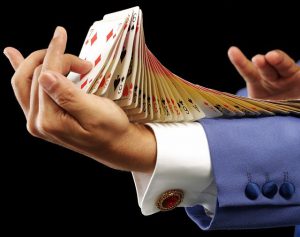Many of us like to play poker – we like to be focused on the cards, know the rules very well and have a few bonus codes to help us out. However, we wouldn’t want to play poker with a magician, who is a master of moving cards and manipulating them, as well as our own attention. But why does that work? You have definitely found out that their magic is just a sleight of hand and that they are very good at manipulating your attention and their own hands. If you haven’t, then stick around, for magic can be explained by science. Science has tried to provide us with answers and if we don’t trust science, what else can we trust?
The Art of Magic

Magicians have been around since forever. During the middle ages, decapitating a duck and then giving the decapitated animal its head back was quite an interesting magic trick. It was not, magic, however, but a simple attention diversion. Magic is mostly about you not being able to see and absorb everything at once. If the magicians had time to set the stage, then you probably have no chance to spot the trick taking place, because your perspective would be shifted to benefit the trick and magicians. But what about knowing the trick and still being tricked by it? Well, that just means that the magician in question is better than your friends who learned the trick from a YouTube tutorial. Magicians, like other artists, don’t give all their tricks away. But what about the science behind it? Why are we fooled by magic tricks.
The Art of Perception Manipulation
The magic in magic is when you get the attention of the people and divert it to a completely new location or object. When their focus is on a certain object, the magic will take place, but they will not notice it, due to their focus being elsewhere. We can only focus on so many things, for example, a single one, unless we are performing an automated act and our brain can wander off a bit. Given that magic requires our full attention, or rather, that it is diverted, tricks happen before our very eyes and we don’t even comprehend them.

Humans believe that they can focus on multiple things at once, especially those who come to magic shows to figure out a trick, but are also tricked as the rest who came only to enjoy. Another thing to note is that laughter is a part of that magic. Once people are laughing, they tend to forget and shift focus, giving more time to the magician to perform their trick. There were studies, conducted by the Barrow Neurological Institute in Phoenix, Arizona, which confirmed that focus and attention are a large part of magic.
The next time you go to see a magic trick, remember that you will most likely be asked to do something or look somewhere. Now, you can try your hardest not to focus on the things at hand and try to spot the trick in the trick, but you can also enjoy and appreciate someone’s effort and preparation. The magic is in the effort.

